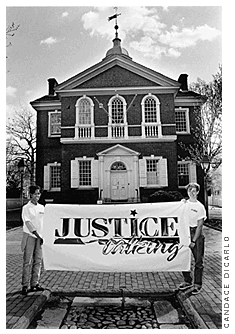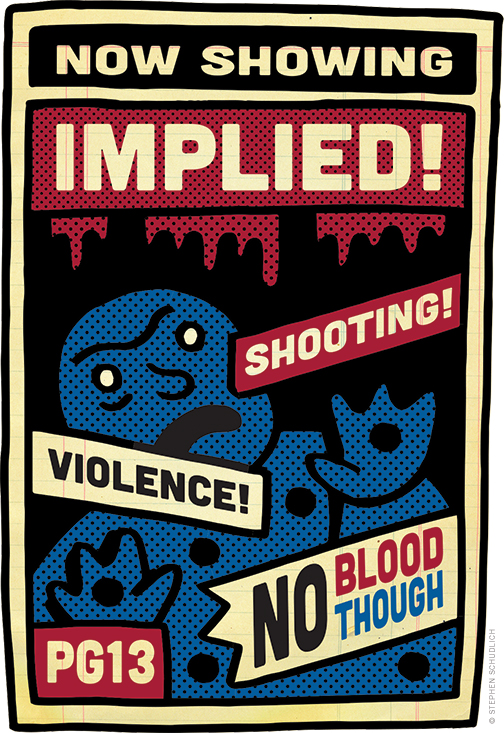
The issues are highly charged and constitutionally complex: Gun control. The fine line between free speech and terrorism. School vouchers. The rights of illegal immigrants. Sodomy laws. Doctor-assisted suicide. Drug use by pregnant women. Censorship on the Web.
Those topics—and others—are being plumbed and debated in a new series of hour-long radio shows called “Justice Talking,” produced by the Annenberg Public Policy Center and co-sponsored by the National Constitution Center and the Penn National Commission on Society, Culture and Community. Taped in front of a live audience at Carpenter’s Hall in Philadelphia’s Independence National Park, each program revolves around a pending lawsuit that touches constitutional nerve-endings. What makes it unique is that those debating the issues are doing so in real depth and constitutional context, not just sound bites.
The goal, says Kathryn Kolbert, the program’s executive producer, is “to discuss hot-button issues that are normally put out into the media as three-minute sound bites. We want to get behind the theory of those issues, and give our guests and listeners an opportunity to explore the issues in greater detail.” If all goes well, “Justice Talking” could be a model for substantive constitutional debate in the electronic media.
“It’s the producer’s dream and nightmare all mixed in together,” Kolbert acknowledges. “We have great topics, really interesting issues—but we have to make them a little less academic and a little bit more engaging, so our listeners stick with us. One of the reasons we want robust debate is we want it to be interesting and entertaining and thoughtful.”
In addition to Kolbert, the program’s team includes National Public Radio correspondent Margot Adler, who serves as host, and producer Julie Drizen C’85, the former bureau chief and executive producer of national programming at Pacifica Radio (not to mention former news director at WXPN).
So far, they’ve taped 13 shows, which began airing on public-radio stations around the country in September. (In Philadelphia, “Justice Talking” is broadcast on WHYY; in New York City, it can be heard on WNYC.) This month, they begin taping another 26 shows. (Further information about the program is available at www.justicetalking.org.)
Another version of “Justice Talking,” scheduled to begin in January, will be designed for talk-radio programs. It will be two hours long and will consist of comments from listeners as well as portions of the already-taped debates in Carpenter’s Hall.
V Kolbert, who has practiced constitutional law for the national American Civil Liberties Union in her work for the Center for Reproductive Law and Policy, says she has been pleasantly surprised at the “fabulous” advocates the program has been able to attract so far. The list includes people like Nadine Strossen, president of the ACLU; Clint Bolick, vice president and director of litigation for the Institute for Justice; and Christopher Darden, the former O.J. Simpson prosecutor.
“We’ve had the actual litigators in cases that have gone to the Supreme Court on the issues that we’ve been debating,” she says. “So we’ve done better than we expected in attracting quality litigators and advocates—on both sides of the issues.”
Carpenter’s Hall, Kolbert says, has proved to be a “fabulous forum” for the show, and not just for the audience. “The seriousness of the hall—its historic importance and its presence in the writing and developing of our constitution—means that the advocates are very aware of the historical importance of what they’re saying.”




